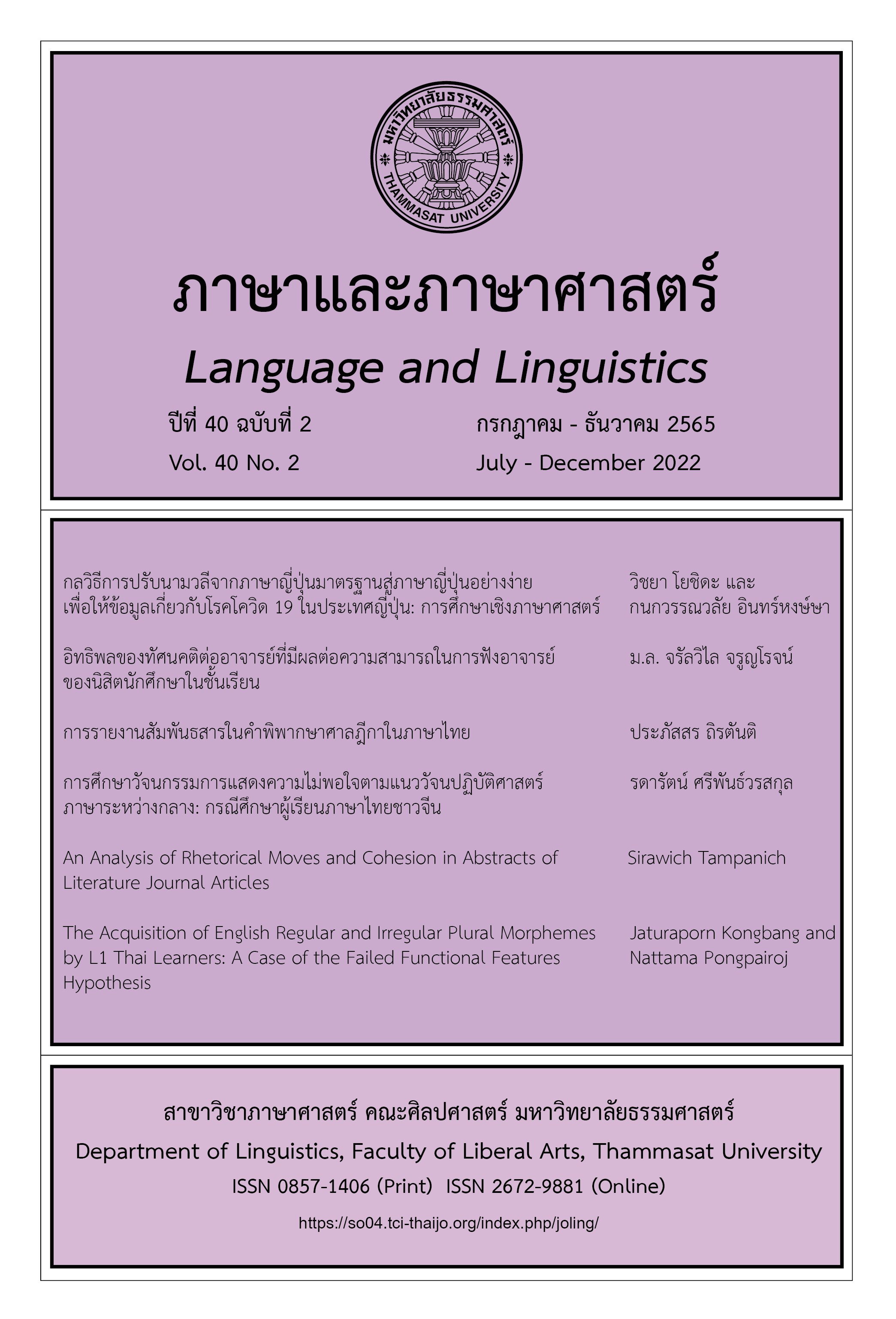The Influence of Attitude toward Lecturers on Students’ Listening Ability in the Classroom
Main Article Content
Abstract
The purpose of this research was to test whether attitudes toward teachers affected students’ listening ability. Undergraduate students of both genders were primed with background information of a teacher who was either male or female, either friendly or unfriendly, and either good or bad. The characteristics of the teacher were randomly shown to the students according to their date and month of birth. Then the students had to evaluate the characterized teacher and themselves on the same 6-point semantic differential scales. The students were shown a teaching video of a male or female teacher, based on the information they had been primed with. After that, they were asked to answer 15 questions that could only be answered using the information provided in the teaching video. The students’ listening ability was inferred from their correct answers. Overall, it was found that students attended more to the teaching of the teacher whom they considered to have more positive characteristics (i.e., friendly, good). However, the degree to which students were similar to—or different from—the teacher had no influence on them attending to what the teacher said. The female gender of both students and the teacher positively affected listening ability.
Article Details

This work is licensed under a Creative Commons Attribution-NonCommercial-NoDerivatives 4.0 International License.
บทความทุกบทความเป็นลิขสิทธิ์ของภาษาและภาษาศาสตร์
References
กิตติยา แซ่เตีย. (2557). การศึกษาเปรียบเทียบทัศนคติของคนไทยที่มีต่อผู้พูดภาษาญี่ปุ่นกับผู้พูดภาษาเกาหลีตามตัวแปรทางสังคม [วิทยานิพนธ์ปริญญามหาบัณฑิต]. มหาวิทยาลัยเกษตรศาสตร์.
ขนิษฐา ใจมโน. (2562). การสังเคราะห์และแนวโน้มการทำงานวิจัยด้านภาษาศาสตร์สังคม. วารสารมังรายสาร, 7(1), 71-90.
จรัลวิไล จรูญโรจน์, ม.ล. (2549). อันนินทากาเลเหมือนเทน้ำ: การตีความจริงลื่นไหล ใจชาย-หญิง. ใน กฤษดาวรรณ หงศ์ลดารมภ์ และจันทิมา เอียมานนท์ (บรรณาธิการ), พลวัตของภาษาไทยปัจจุบัน (น. 53-82). สำนักพิมพ์แห่งจุฬาลงกรณ์มหาวิทยาลัย.
จรัลวิไล จรูญโรจน์, ม.ล. (2556). ทัศนคติของนิสิตระดับอุดมศึกษาต่อการใช้ภาษาของอาจารย์. วารสารมนุษยศาสตร์, 20(1), 167-188.
ธีรวุฒิ เอกะกุล. (2543). ระเบียบวิธีวิจัยทางพฤติกรรมศาสตร์และสังคมศาสตร์. สถาบันราชภัฏอุบลราชธานี.
ปัทมา เหมือนสมัย. (2557). คำอ้างถึงบุรุษของคนไทยที่ใช้สนทนากับสัตว์เลี้ยง. [วิทยานิพนธ์ปริญญามหาบัณฑิต]. มหาวิทยาลัยเกษตรศาสตร์.
ศุภฤกษ์ หอมแก้ว. (2540). การแปรของ (E) ในภาษาไทยถิ่นนครศรีธรรมราช ตามตัวแปรอายุและทัศนคติต่อภาษา [วิทยานิพนธ์ปริญญามหาบัณฑิต]. จุฬาลงกรณ์มหาวิทยาลัย.
สำนักงานสถิติแห่งชาติ. (2561). จำนวนนิสิตนักศึกษาระดับอุดมศึกษา (ปริญญาตรี) ในระบบโรงเรียน จำแนกตามสังกัด ปีการศึกษา 2557 – 2561. http://statbbi.nso.go.th/staticreport/Page/sector/TH/report/sector_03_7_TH_.xlsx
อมรา ประสิทธิ์รัฐสินธุ์. (2556). ภาษาศาสตร์สังคม (พิมพ์ครั้งที่ 5). โรงพิมพ์แห่งจุฬาลงกรณ์มหาวิทยาลัย.
อมรา ประสิทธิ์รัฐสินธุ์, กิตตินาถ เรขาลิลิต, กุสุมา ทองเนียม, จรัลวิไล จรูญโรจน์, ม.ล., ฉัตรชนก จันทร์แย้ม, ชุติชล เอมดิษฐ, พรพิมล ศิวินา, พีระ ผิวนิ่ม, ภาวดี สายสุวรรณ, ภีมพสิษฐ์ เตชะราชันย์, มนสิการ เฮงสุวรรณ, วริสรา จันทรัฐ, สะเกษษ์ พุทธพิทักษ์. (2562). สถานการณ์ภาษาในประเทศไทย: บทบาทของภาษาประจำชาติกับภาษานานาชาติ. สำนักพิมพ์จุฬาลงกรณ์มหาวิทยาลัย.
อุไรภรณ์ ตันตินิมิตรกุล. (2544). การแปรของเขตปรับเปลี่ยนระหว่างภาษาไทยถิ่นกลางกับภาษาไทยถิ่นใต้ตามตัวแปรทางสังคมบางประการ [วิทยานิพนธ์ปริญญามหาบัณฑิต]. จุฬาลงกรณ์มหาวิทยาลัย.
Bem, S. L. (1981). Gender schema theory: A cognitive account of sex typing. Psychological Review, 88(4), 354-364. https://doi.org/10.1037/0033-295X.88.4.354
Blackwell, N. L. (2013). Attitude and involvement in language processing (Document No. osu1523896565730483) [Doctoral dissertation, University of California Santa Cruz]. UC Santa Cruz Electronic Theses and Dissertations. https://escholarship.org/uc/item/6qm7b7s2
Chanyam, N. (2002). A study of language attitude toward Thai dialects and their speakers: A case study of four campuses of Rajamagala Institute of Technology [Unpublished master’s thesis]. Mahidol University.
Forshey, A. L. (2013). Effects of reading attitude on reading achievement of students in grades one through six. (Publication No. 3561714) [Doctoral dissertation, Ball State University]. ProQuest Dissertations & Theses Global.
Garrett, P. (2010). Attitudes to language: Key topics in sociolinguistics. Cambridge University Press.
Hashemi, L., & Thomas, B. (2011). IELTS trainer six practice tests with answers and audio CDs. Cambridge English.
Holmes, J. (2013). An Introduction to sociolinguistics (4th ed.). Pearson Education.
Kingir, S., & Aydemir, N. (2012). An investigation of the relationships among 11th grade students’ attitudes toward chemistry, metacognition, and chemistry achievement. Gazi University Journal of Gazi Educational Faculty, 32(3), 823-842.
Kwon, H., Ha, S., & Im, H. (2016). The impact of perceived similarity to other customers on shopping mall satisfaction. Journal of Retailing and Consumer Services, 28, 304–309.
Meyer, E. (2015). The culture map. Public Affairs Press.
Osgood, C. E., Suci, G. L., & Tannenbaum, P. (1957). The measurement of meaning. University of Illinois Press.


